牛津英语8BUnit1全套教案
- 格式:doc
- 大小:407.01 KB
- 文档页数:20
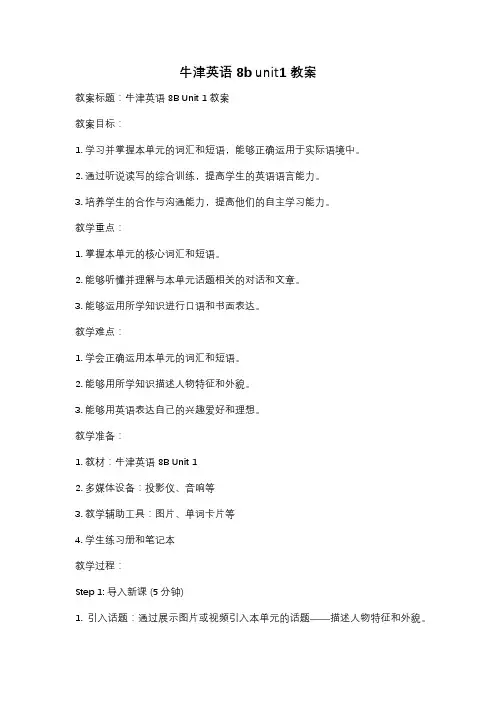
牛津英语 8b unit1 教案教案标题:牛津英语 8B Unit 1 教案教案目标:1. 学习并掌握本单元的词汇和短语,能够正确运用于实际语境中。
2. 通过听说读写的综合训练,提高学生的英语语言能力。
3. 培养学生的合作与沟通能力,提高他们的自主学习能力。
教学重点:1. 掌握本单元的核心词汇和短语。
2. 能够听懂并理解与本单元话题相关的对话和文章。
3. 能够运用所学知识进行口语和书面表达。
教学难点:1. 学会正确运用本单元的词汇和短语。
2. 能够用所学知识描述人物特征和外貌。
3. 能够用英语表达自己的兴趣爱好和理想。
教学准备:1. 教材:牛津英语 8B Unit 12. 多媒体设备:投影仪、音响等3. 教学辅助工具:图片、单词卡片等4. 学生练习册和笔记本教学过程:Step 1: 导入新课 (5分钟)1. 引入话题:通过展示图片或视频引入本单元的话题——描述人物特征和外貌。
2. 引导学生讨论:提问学生关于人物特征和外貌的问题,激发学生的兴趣。
Step 2: 单词和短语学习 (15分钟)1. 呈现并教授本单元的核心词汇和短语,如appearance, personality, curly hair, freckles等。
2. 运用多种教学方法,如图片展示、示范、游戏等,帮助学生理解和记忆新词汇。
Step 3: 听力训练 (15分钟)1. 播放录音,让学生听对话和短文,然后回答相关问题。
2. 引导学生仔细倾听,帮助他们提高听力技巧和理解能力。
Step 4: 口语练习 (20分钟)1. 分组活动:将学生分成小组,让他们互相描述自己和其他人的外貌和个性特征。
2. 教师巡回指导,纠正学生的发音和语法错误,并给予表扬和鼓励。
Step 5: 书面表达 (15分钟)1. 要求学生根据所学内容,写一篇短文介绍自己的外貌和个性特征。
2. 学生可以参考教材中的范文,并在教师的指导下进行修改和完善。
Step 6: 小结与反思 (5分钟)1. 教师对本节课的重点内容进行总结,并强调学生的学习成果。
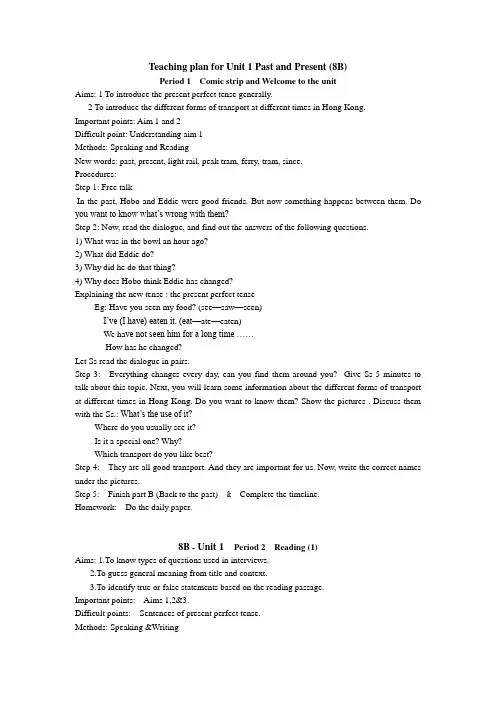
Teaching plan for Unit 1 Past and Present (8B)Period 1 Comic strip and W elcome to the unitAims: 1 To introduce the present perfect tense generally.2 To introduce the different forms of transport at different times in Hong Kong.Important points: Aim 1 and 2Difficult point: Understanding aim 1Methods: Speaking and ReadingNew words: past, present, light rail, peak tram, ferry, tram, since.Procedures:Step 1: Free talkIn the past, Hobo and Eddie were good friends. But now something happens between them. Do you want to know what’s wrong with them?Step 2: Now, read the dialogue, and find out the answers of the following questions.1) What was in the bowl an hour ago?2) What did Eddie do?3) Why did he do that thing?4) Why does Hobo think Eddie has changed?Explaining the new tense : the present perfect tenseEg: Have you seen my food? (see—saw—seen)I’ve (I have) eaten it. (eat—ate—eaten)We ha ve not seen him for a long time ……How has he changed?Let Ss read the dialogue in pairs.Step 3: Everything changes every day, can you find them around you? Give Ss 5 minutes to talk about this topic. Next, you will learn some information about the different forms of transport at different times in Hong Kong. Do you want to know them? Show the pictures . Discuss them with the Ss.: What’s the use of it?Where do you usually see it?Is it a special one? Why?Which transport do you like best?Step 4: They are all good transport. And they are important for us. Now, write the correct names under the pictures.Step 5: Finish part B (Back to the past) &Complete the timeline.Homework: Do the daily paper.8B - Unit 1 Period 2 Reading (1)Aims: 1.To know types of questions used in interviews.2.To guess general meaning from title and context.3.To identify true or false statements based on the reading passage.Important points: Aims 1,2&3.Difficult points: Sentences of present perfect tense.Methods: Speaking &WritingProcedures:Step1: Dictation.Let Ss dictate the names of transports.Step2:Free talkT: Y ou know, I am a teacher now. But five years ago, I was a teacher, too. So I have worked here for 3 years. I think our school changed a lot..Do you think so?S1: Y es, I do.T: What are the changes? Can you give us some examples?S1: The TV is….,The wall is…,Our School life is…,T: So, Everything has changed a lot?Step3: Presentation.1).T: Did you hear of Sunshine Town? Now, look at some pictures of it. find some Ss to say Sth about it.2). T: Would you like to listen to Mr Chen, Daniel’s grandpa?Play the tape for Ss 2 times.3). T may ask Ss some questions:a. How long has Mr Chen known Sunshine Town?b. Did Mr Chen live there all the time? Why?c. Does Mr Chen think the place changed a lot?d. What are the differences between the past and present?4). Check the answers if they can not answer. Explain some difficult points.5). Ask Ss to read in pairs and try to act it out.Step4: Practice.1. Finish off the exercises of partC on P6.(T/F).Correct the sentences.2. Do the daily exercises.Step5:Homework.a.Finish off the exercises.(WB)b. Read the conversation and act it out freely.8B - Unit 1 Period 3 Reading (2)Aims & demands: 1. Recognize types of questions used in interviews2. Master the phrases: in fact/get married/another flat /move out of…/market stalls/play chess/play cards /in some ways/feel a bit lonely/from time to time3. Master the sentences: a. I have known the place for many years. b. I have known it since I was very young. c. It’s nice to do….Key points: 1. have +done 结构 2. Aims2Tools: Pictures & recorderMethods: Explaining & practicingProcedures:Step1. Revision1. Have a dictation.2. Ask some questions:a. Who is Mr Chen?b. What do you know about Mr Chen?c. What was in Sunshine Town in the past?d. How many people lived there?e. What is Sunshine Town now?f. What does Mr Chen do in the new park?g. Why is it much cleaner now?3. Let Ss talk about the changes to Sunshine Town.4. Finish Part D and check the answers.Step2. Explaining1. Present perfect tense: have/has + done现在完成时表示:1)动作发生在过去,对现在有影响或与现在有联系;2)动作发生在过去,并延续到现在。
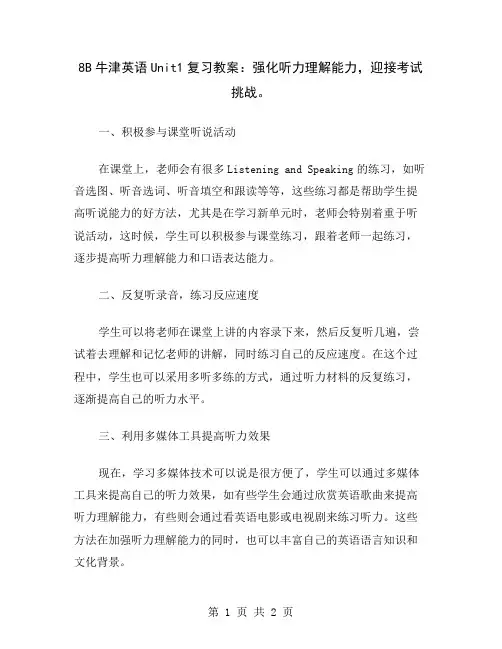
8B牛津英语Unit1复习教案:强化听力理解能力,迎接考试挑战。
一、积极参与课堂听说活动在课堂上,老师会有很多Listening and Speaking的练习,如听音选图、听音选词、听音填空和跟读等等,这些练习都是帮助学生提高听说能力的好方法,尤其是在学习新单元时,老师会特别着重于听说活动,这时候,学生可以积极参与课堂练习,跟着老师一起练习,逐步提高听力理解能力和口语表达能力。
二、反复听录音,练习反应速度学生可以将老师在课堂上讲的内容录下来,然后反复听几遍,尝试着去理解和记忆老师的讲解,同时练习自己的反应速度。
在这个过程中,学生也可以采用多听多练的方式,通过听力材料的反复练习,逐渐提高自己的听力水平。
三、利用多媒体工具提高听力效果现在,学习多媒体技术可以说是很方便了,学生可以通过多媒体工具来提高自己的听力效果,如有些学生会通过欣赏英语歌曲来提高听力理解能力,有些则会通过看英语电影或电视剧来练习听力。
这些方法在加强听力理解能力的同时,也可以丰富自己的英语语言知识和文化背景。
四、背诵英语文本,熟练掌握常用句型背诵英语文本可以帮助学生在短时间内提升英语水平,掌握常用句型也是强化英语听力理解能力的一种方法。
学生可以从短文、电影片段、英文歌曲中选取自己喜欢的内容背诵,可以利用抄写或录音的方式帮助记忆和理解,这样可以提高学生对英语语言结构和单词用法的认识。
五、注意挑选听材料,注重效果与兴趣的兼顾学生在挑选听材料时,一定要注意自己的能力和兴趣,既要注意提高英语水平的效果,也要注意兼顾自己的兴趣。
有时候,学生太注重听力效果而忽略了自己的兴趣,这会让学生对英语学习失去兴趣,从而影响积极性和学习效果。
所以,学生可以通过选择与自己相关和感兴趣的文本,更好地挑战英语听力优秀成绩。
听力理解能力是英语学习中必须掌握的重要技能,我们必须采取科学合理的方法来提高它,了解和学习英语语言结构、掌握英语语言用法等是其中不可或缺的一部分。
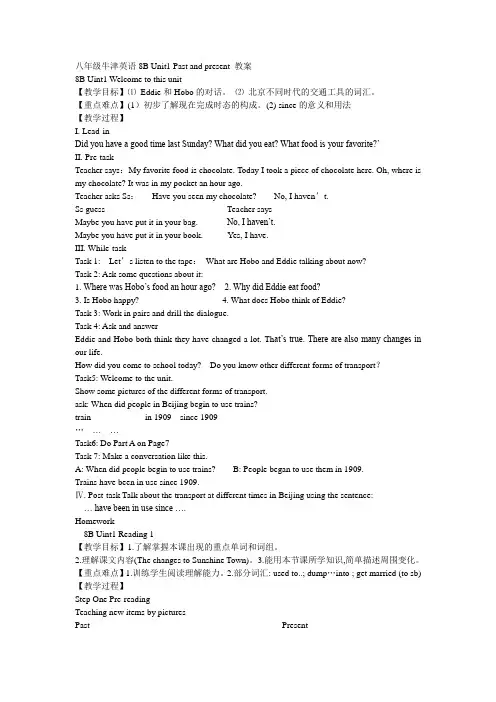
八年级牛津英语8B Unit1 Past and present 教案8B Uint1 Welcome to this unit【教学目标】⑴Eddie和Hobo的对话。
⑵北京不同时代的交通工具的词汇。
【重点难点】(1)初步了解现在完成时态的构成。
(2) since的意义和用法【教学过程】I. Lead-inDid you have a good time last Sunday? What did you eat? What food is your favorite?‟II. Pre-taskTeacher says:My favorite food is chocolate. Today I took a piece of chocolate here. Oh, where is my chocolate? It was in my pocket an hour ago.Teacher asks Ss:---Have you seen my chocolate? ---No, I haven’t.Ss guess Teacher saysMaybe you have put it in your bag. ----No, I haven‟t.Maybe you have put it in your book. ----Yes, I have.III. While-taskTask 1: Let’s listen to the tape:What are Hobo and Eddie talking about now?Task 2: Ask some questions about it:1. Where was Hobo‟s food an hour ago?2. Why did Eddie eat food?3. Is Hobo happy?4. What does Hobo think of Eddie?Task 3: Work in pairs and drill the dialogue.Task 4: Ask and answerEddie and Hobo both think they have changed a lot. Th at‟s true. There are also many changes in our life.How did you come to school today? Do you know other different forms of transport?Task5: Welcome to the unit.Show some pictures of the different forms of transport.ask: When did people in Beijing begin to use trains?train in 1909 since 1909………Task6: Do Part A on Page7Task 7: Make a conversation like this.A: When did people begin to use trains? B: People began to use them in 1909.Trains have been in use since 1909.Ⅳ. Post-task Talk about the transport at different times in Beijing using the sentence:… have been in use since ….Homework8B Uint1 Reading 1【教学目标】1.了解掌握本课出现的重点单词和词组。
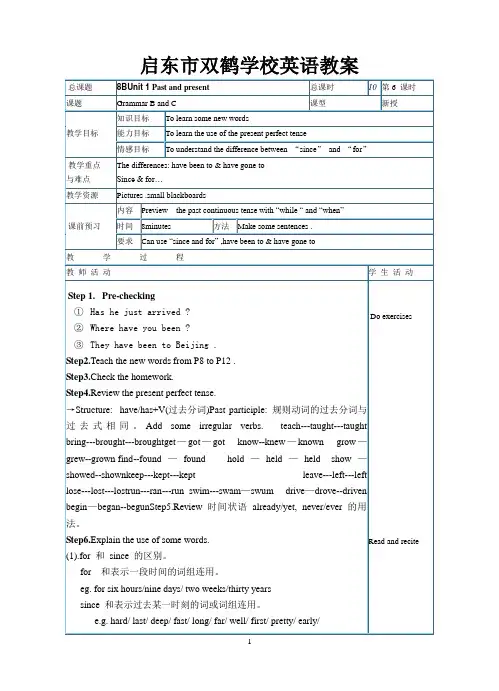
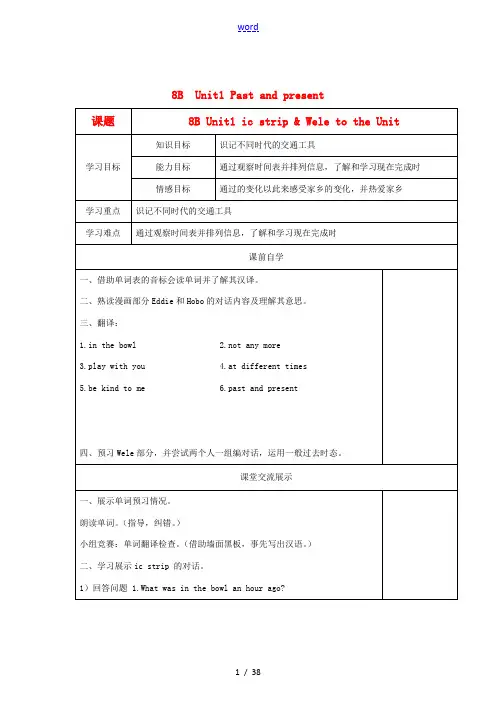
8B Unit1 Past and present8B Units1导学案参考答案Unit1第一课时:一、1.was 2.has eaten 3.to have 4.to play 5.is eating 6.took 7.rode8.will be二、1.would like , grows up 2.walks to school 3.goes to work by bus 4.flies to5.don’t want to any more第二课时:一、1.know about 2.get married 3.move out 4.water pollution 5.in the centreof6.feel lonely7.turn into8.from time to timeed to do 10.in some ways二、well has lived southern got married in the centre of children has changed a lotmarket stallsHas turned into to play cards pleasant shoe factory waste waterfish and plants polluted took action cleaner in some ways open space lonely第三课时:一、1. I don’t want to play with you any more.2.There used to be the home of birds.3.He live in Beijing since he moved here.4.In the past ,many people had no money to go to school.5.Nanjing has changed a lot in the past five years.6.Many friends have moved to other places ,so I feel lonely from time to time.7.I had an interview with my Chinese teacher this morning.8.It has bee more difficult to play chess with my old friends.二、1.Where have they gone ..2.How long has lived3.When was born4.you helping me第四课时:一、1.dishonest 2.unhappy 3.unlucky 4.impolite 5.unkind二、D C C B C A三、1.cheaper 2.healthiest 3.impossible 4.safely 5.well better第五课时:一、1.They haven’t read the book yet.Have they read the book yet? Yes, they have/ No , they haven’t1.How long has Daniel stayed in Shanghai?2. I have known him for ten years.3.Sandy has been in Beijing for half an hour.二、1. Have seen have did see2.lent hasn’t given 3.have been did visit第六课时:一、C C A A D B二、1. He has already finished homework.2.Have you ever been to Beijing?3.I have known Linda for 3years.4. I have just seen Lily.5.We haven’t heard from him for a long time.第七课时:一、1.is 2.do 3.will be 4.shall go 5.taught 6.has taught 7.has gone8.Have seen 9.have learned 10.will arrive二、1.How long have you known him?2.Has Jane finished her homework?3.I haven’t worked in this school for two years.4.Why hasn’t Jim finishedhis homework?5.when did you buy this watch?6.Who is the old man next to Lily?7.Which girl is my sister?8.How far is your home from your school?第八课时:一、1.advantages 2.reduce 3.changed 4.developments 5.service6.interview7.realizes 9.repair二、1.recently 2.unpleasant 3.impolite 4.have done 5.left6.southern7.polluted8.Has arrived arrived9.has eaten 10.have been第九课时:第十课时:一、1.as often as before 2. have an interview with sb ed to do sth 4.so big and modern5.in the north of二、1. was has lived 2.was made 3.Has arrived arrived 4.has eaten5.safely6.has been7.have been三、1.B 2.C 3.B 4.C 5.D 6.A四、1.Have you anything 2.doesn’t provide any longer 3.since ago ed to5.has been to。
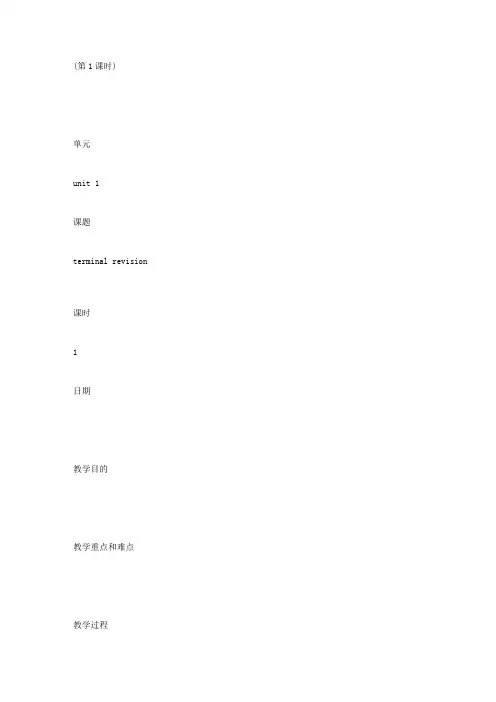
(第1课时)单元unit 1课题terminal revision 课时1日期教学目的教学重点和难点教学过程三、重点结构:it is easy for him to see them as often as before.1、现在完成时所表示的动作发生在过去,但考虑较多的不是动作发生在过去的什么时候,而是强调与目前的联系,即过去与现在的关系。
强调过去的动作对目前造成的影响和后果,或强调动作本身或状态持续地现在,因此属于现在时范畴。
它的主要用法可概括为八个字:影响、结果、持续和经历。
2、现在完成时的构成:3、现在完成时的用法(1)表示过去发生的某一动作对现在生成的影响或结果。
如:he has read the book.他已经读过这本书了。
“读书”是发生在过去的动作,对现在造成的结果是“读过了”。
(2) 表示动作过去已经开始,持续到现在,可能还要继续下去。
这时往往与表示一段时间的状语连用。
i have been in suzhou for ten years. 我来苏州已经十年了。
i have never heard of him before. 过去我从未听说过他。
the meeting has been on for half an hour. 会已开始半小时了。
he has been in the army for three years. 他参军三年了。
(5)其他词组的区别for短语表示动作延续多长时间,for后面跟时间段。
如:he has lived here for three years.他住这儿已经三年了。
i haven’t seen her for a long time.我已经好久没见到她了。
②have/has been in, have/has been to和have/has gone to的区别have/has been in表示“在某地呆了多久了”,可以与表示一段时间的状语连用。
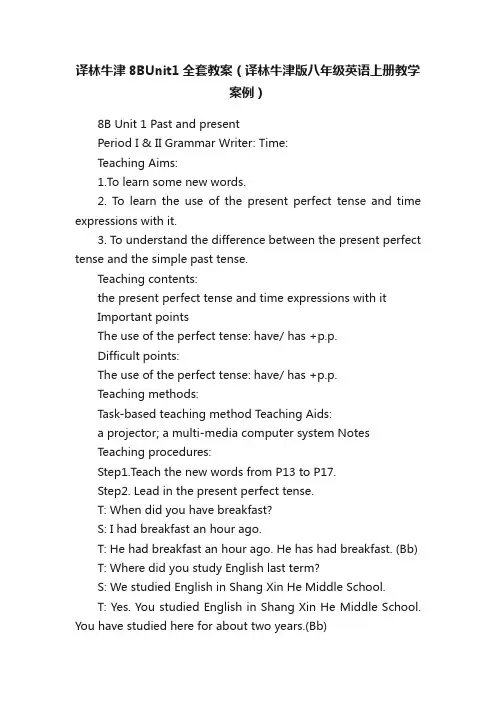
译林牛津8BUnit1全套教案(译林牛津版八年级英语上册教学案例)8B Unit 1 Past and presentPeriod I & II Grammar Writer: Time:Teaching Aims:1.To learn some new words.2. To learn the use of the present perfect tense and time expressions with it.3. To understand the difference between the present perfect tense and the simple past tense.Teaching contents:the present perfect tense and time expressions with itImportant pointsThe use of the perfect tense: have/ has +p.p.Difficult points:The use of the perfect tense: have/ has +p.p.Teaching methods:Task-based teaching method Teaching Aids:a projector; a multi-media computer system NotesTeaching procedures:Step1.Teach the new words from P13 to P17.Step2. Lead in the present perfect tense.T: When did you have breakfast?S: I had breakfast an hour ago.T: He had breakfast an hour ago. He has had breakfast. (Bb) T: Where did you study English last term?S: We studied English in Shang Xin He Middle School.T: Yes. You studied English in Shang Xin He Middle School. You have studied here for about two years.(Bb)→我们用一般过去时谈论过去发生的动作,但当过去发生的动作和现在有联系有影响时,我们用现在完成时态.(Refer to P13)→Structure: have/has +V (过分)Step 3. How we form the past participles of verbs P13 (Add the simple past forms)Add: have---had---had hear---heard---heard buy---bought---boughtgo---went---gone do---did----done eat---ate---eatenforget---forgot---forgotten cut---cut---cut read---read---readStep 4.Explain the use of the present perfect tense.(一) 基本用法:1. 到现在为止这段时间已发生的情况.动作从过去延续到现在.eg. She has been ill for three days. (She’s been…)We have learned 2,000 English words. (We’ve …)2. 某个动作虽是过去发生,但其后果和影响及于现在.eg. Thanks you. I’ve had my supper.(现在用不着吃)Tom has seen the film.(对这部电影有所了解)(二) 时间状语: already, yet(否,疑), since, ever, never, just, before(句尾),for+时间段, recentlyeg. She has already finished her work.I have ever heard about it.Step 5. Change the above sentence patterns to general questions, negative sentences and question the underlined parts.Step 6. Make sentences P14 A1Step 7. Compare the difference between the present perfect tense and the simple past tense.现在完成时的特点是某一动作发生与现在有联系,一般过去时则单纯谈过去发生的某一动作,不涉及对现在的影响.e.g. Simon has lost his watch./ Simon lost his watch.Have you bought a pen? / When did you buy the pen?What did you have for lunch? / Have you had lunch?etc注:句中有表示过去的时间状语如yesterday, last week,…ago etc,不能用现在完成时.Step 8.Chat time P11, A2Step 9. Time expressions with the present perfect tense. P16. BTell students that present perfect tense must have a specific time when it is used. These time expressions include already, ever, for…, just, never, since…, yet, recently. Explain in Chinese ‘already, just, never通常用于have 或has后;而yet 和recently通常放句末。
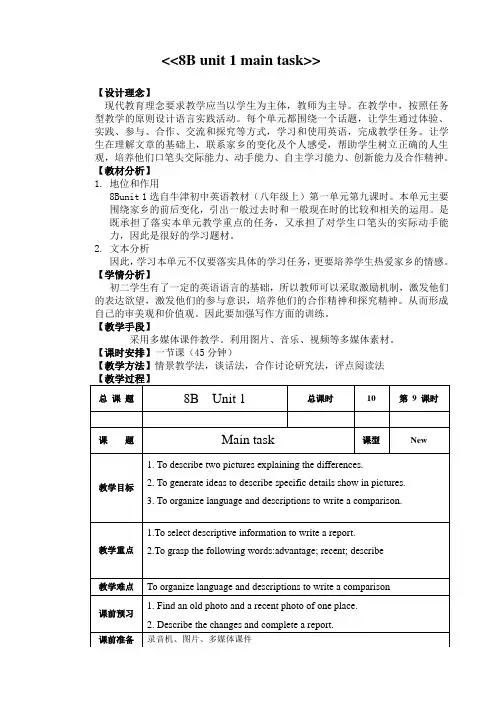
<<8B unit 1 main task>>
【设计理念】
现代教育理念要求教学应当以学生为主体,教师为主导。
在教学中,按照任务型教学的原则设计语言实践活动。
每个单元都围绕一个话题,让学生通过体验、实践、参与、合作、交流和探究等方式,学习和使用英语,完成教学任务。
让学生在理解文章的基础上,联系家乡的变化及个人感受,帮助学生树立正确的人生观,培养他们口笔头交际能力、动手能力、自主学习能力、创新能力及合作精神。
【教材分析】
1.地位和作用
8Bunit 1选自牛津初中英语教材(八年级上)第一单元第九课时。
本单元主要围绕家乡的前后变化,引出一般过去时和一般现在时的比较和相关的运用。
是既承担了落实本单元教学重点的任务,又承担了对学生口笔头的实际动手能力,因此是很好的学习题材。
2.文本分析
因此,学习本单元不仅要落实具体的学习任务,更要培养学生热爱家乡的情感。
【学情分析】
初二学生有了一定的英语语言的基础,所以教师可以采取激励机制,激发他们的表达欲望,激发他们的参与意识,培养他们的合作精神和探究精神。
从而形成自己的审美观和价值观。
因此要加强写作方面的训练。
【教学手段】
采用多媒体课件教学。
利用图片、音乐、视频等多媒体素材。
【课时安排】一节课(45分钟)
【教学方法】情景教学法,谈话法,合作讨论研究法,评点阅读法。
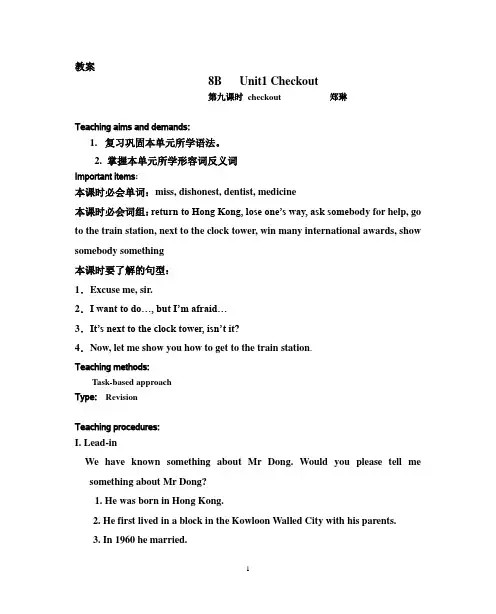
教案8B Unit1 Checkout第九课时checkout 郑琳Teaching aims and demands:1.复习巩固本单元所学语法。
2. 掌握本单元所学形容词反义词Important items:本课时必会单词:miss, dishonest, dentist, medicine本课时必会词组:return to Hong Kong, lose one’s way, ask some body for help, go to the train station, next to the clock tower, win many international awards, show somebody something本课时要了解的句型:1.Excuse me, sir.2.I want to do…, but I’m afraid…3.It’s next to the clock tower, isn’t it?4.Now, let me show you how to get to the train station.Teaching methods:Task-based approachType: RevisionTeaching procedures:I. Lead-inWe have known something about Mr Dong. Would you please tell me something about Mr Dong?1. He was born in Hong Kong.2. He first lived in a block in the Kowloon Walled City with his parents.3. In 1960 he married.4. His wife and he moved to another flat in the same block after he gotmarried.5. In 1991 he moved out of the Kowloon Walled City.II. Pre-taskT: Why did Mr Dong move out of the Kowloon Walled City?S: Because the government wanted to build a new park there.T: Although things have changed a lot over the years, Mr Dong still knows the Kongloon Walled City very well. When a tourist asks the way, can Mr Dong help him?III. While-taskTask 1 Ask the students to do Part A. Pay attention to the correct forms of the verbs. Then check the students’ answers.Task 2 Ask the students to read the dialogue in pairs. Ask the questions:1. Where is the train station in the past?2. How is the new airport?3. Does Mr Dong show the tourist the way to the train station?Task 3 Complete the following dialogue:A: Excuse me, could you _______(tell) me the way to the post office? I ______(lose) the way. I want ________(post) the letter. The post office ________(be)here in the past. But now I’m afraid it ________(move).B: Yes, _______(go) down this street, then _______(turn) left at the first crossing. At the end of the road you _______(find) it.A: How far is it from here?B: It’s about twenty minutes’ ________( walk).A: Can I take a bus?B: Yes.A: Thank you. Things __________(change) a lot in this city. I _______(be) here twice. People here are very friendly.B: Not at all.IV. Post-taskV. HomeworkA. Do PartB.B. 根据英文解释在空白处填上一个恰当的词:1. I lived with my parents until 1995 when I got _______ (having a husband or wife)2. Lily thinks that it’s _______(not very bad) to be a _______ (people who look after our teeth) in the future.3. Did you feel ________(unhappy because you are alone) when you are in America last summer?4. He is a _______(not honest) boy. He often tells a lie.5. This plane is _______(not same) from that one. It’s much bigger.6. I won’t take this coat because it’s too _________(not cheap).7. Nothing is _________(not possible) if you put your heart into it.8. It’s ________(not polite) to disturb others.C. 学习语言难免要犯错,你能找出下列句中的错误,并改正它吗?1. I have bought this computer for about 3 years.2. We have studied in this school in September,2003.3. He often has a good rest on Saturday morning, hasn’t he?4. How many times has he gone to Shanghai before?5. He has got married for two years.6. How long has she arrived in Nanjing?7. She has left her hometown since she was very young.8. He has fallen asleep for two ours.9. China has joined WTO since November, 2001.10. I have started to study here for over two years.D. 翻译下列句子1.我已经吃过午饭,我是在11:30吃午饭的。
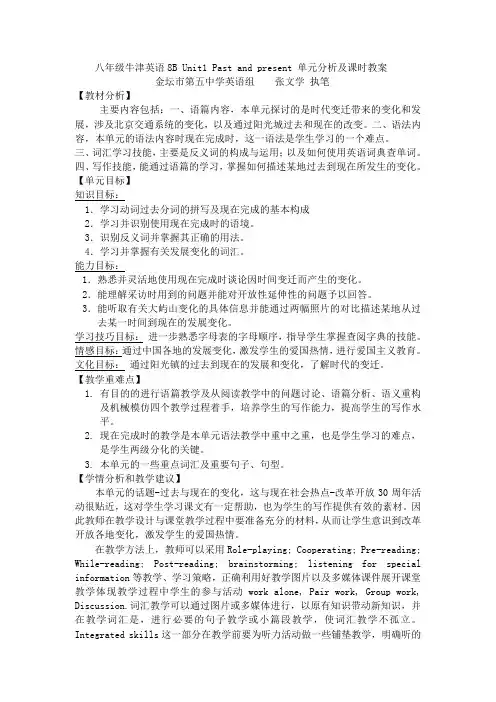
八年级牛津英语8B Unit1 Past and present 单元分析及课时教案金坛市第五中学英语组张文学执笔【教材分析】主要内容包括:一、语篇内容,本单元探讨的是时代变迁带来的变化和发展,涉及北京交通系统的变化,以及通过阳光城过去和现在的改变。
二、语法内容,本单元的语法内容时现在完成时,这一语法是学生学习的一个难点。
三、词汇学习技能,主要是反义词的构成与运用;以及如何使用英语词典查单词。
四、写作技能,能通过语篇的学习,掌握如何描述某地过去到现在所发生的变化。
【单元目标】知识目标:1.学习动词过去分词的拼写及现在完成的基本构成2.学习并识别使用现在完成时的语境。
3.识别反义词并掌握其正确的用法。
4.学习并掌握有关发展变化的词汇。
能力目标:1.熟悉并灵活地使用现在完成时谈论因时间变迁而产生的变化。
2.能理解采访时用到的问题并能对开放性延伸性的问题予以回答。
3.能听取有关大屿山变化的具体信息并能通过两幅照片的对比描述某地从过去某一时间到现在的发展变化。
学习技巧目标:进一步熟悉字母表的字母顺序,指导学生掌握查阅字典的技能。
情感目标:通过中国各地的发展变化,激发学生的爱国热情,进行爱国主义教育。
文化目标:通过阳光镇的过去到现在的发展和变化,了解时代的变迁。
【教学重难点】1.有目的的进行语篇教学及从阅读教学中的问题讨论、语篇分析、语义重构及机械模仿四个教学过程着手,培养学生的写作能力,提高学生的写作水平。
2. 现在完成时的教学是本单元语法教学中重中之重,也是学生学习的难点,是学生两级分化的关键。
3. 本单元的一些重点词汇及重要句子、句型。
【学情分析和教学建议】本单元的话题-过去与现在的变化,这与现在社会热点-改革开放30周年活动很贴近,这对学生学习课文有一定帮助,也为学生的写作提供有效的素材。
因此教师在教学设计与课堂教学过程中要准备充分的材料,从而让学生意识到改革开放各地变化,激发学生的爱国热情。
在教学方法上,教师可以采用Role-playing; Cooperating; Pre-reading; While-reading; Post-reading; brainstorming; listening for special information等教学、学习策略,正确利用好教学图片以及多媒体课件展开课堂教学体现教学过程中学生的参与活动work alone, Pair work, Group work, Discussion.词汇教学可以通过图片或多媒体进行,以原有知识带动新知识,并在教学词汇是,进行必要的句子教学或小篇段教学,使词汇教学不孤立。
Title (课题)Comic strip Type(课型)New新授课Period(课时)1Supporting theories (理论支持)A.任务型教学(Task-based Approach)是指教师通过引导语言学习者在课堂上完成任务来进行的教学。
有助于激发学生的学习兴趣,培养学生综合的语言运用能力,发挥学生的主体性作用,拓宽学生的知识面。
使学生保持学习的积极性,养成良好的学习习惯,达到全面发展B. 情境教学法(Situational Teaching Method) 是指在教学过程中,教师有目的地引入或创设具有一定情绪色彩的、以形象为主体的生动具体的场景,以引起学生一定的态度体验,从而帮助学生理解教材,并使学生的心理机能能得到发展的教学方法。
情境教学法的核心在于激发学生的情感。
情境教学中的特定情境,提供了调动人的原有认知结构的某些线索,经过思维的内部整合作用,人就会顿悟或产生新的认知结构。
情境所提供的线索起到一种唤醒或启迪智慧的作用。
Aims & demands (教学目标)A: 知识目标To introduce the concept of situations that started in the past and is continuing in the past.B: 能力目标? To introduce the grammatical concept of the present perfect tense.C: 情感目标To let the students feel proud of the changes.Key points & diff iculties (教学重、难点)Teaching Methods (教学方法)Task-based approach Situational Teaching MethodAids:课前准备(教具、活动准备等)1. Get some cards with words ready.2. Blackboard; computer; OHP (overhead projector). 教学设计课前延伸 1. Preview the new words and phrases.2. Finish off the exercises of this part.让学生通过课前自学,小组内的团结合作解决预习中的一些问题,为上课做准备Teaching Plan (授课计划) Studying Plan(学习计划)Aims(设计意图)课内探究课内探究学导练StepⅠRevision1. Dictate new words from own tocheck.1. 让学生通过课前自学,小组内的团结合作解决预习中的一些问题,为上课做准备。
牛津初中英语8BUnit1教学案教学目的To go over the knowledge in unit 1教学重点和难点present perfect tense and some words and expressions 教学过程一、重点短语Welcome to the unitpast and present 过去和现在do a history project做(研究)一个历史课题over the past/last 100 years= during/in the past/last 100 years在过去的100年当中(常用于现在完成时)transport at different times 在不同时代的交通工具Readingknow …very well 对…..很了解since then = ever since从那时起(常用于现在完成时)move house 搬家in the southern part of town (adj)在城镇的南部地区get/be married 结婚(前者短暂性,后者延续性)marry sb = get/be married to sb与某人结婚till/until “直到”肯定句, 延续性not ……until/till“直到……才”否定句,短暂性move to another flat 搬进另一套公寓in the centre of town 在城镇的中心change a lot 变化很大over the years 在这些年间in the past在过去(用于一般过去时) market stalls市场货摊go to the cinema 去看电影turn/change……into……把……变成……play cards and Chinese chess打牌,下中国象棋a pleasant trip/talk令人愉快的旅行/谈话(adj,修饰事物)a shoe factory 一家鞋厂water/noise/air pollution水/噪音/空气污染used to do sth / used to be过去常常做某事(但现在已不做) / 过去曾经是there once was = there used to be过去曾经有dump the waste into the river把废物倾倒入河里the poison in the waste废料里面的毒素pollute the river 污染河流a very serious problem(adj) /be seriously hurt(adv)一个非常严重的问题/严重地受伤take action to reduce the pollution采取措施减少污染in some ways = in a way 在某些方面open space 开阔的空间feel a bit lonely 感到有点孤独from time to time = sometimes=at times不时地;有时until now 直到现在throw away 扔掉(代词放中间)move into/out of 搬进/从……搬出as well as 和,又,而且as often as before 像以前一样经常Vocabulary and Grammarwrite an article on写一篇关于……的文章have an interview with sb.(n) = interview sb (v)对某人进行一次采访the history of ……的历史miss old friends / miss the train / miss doing想念老朋友/ 错过火车/ 没干成某事feel happy/unhappy about对……感到开心/不开心be lucky enough to do……幸运得足以……the changes to Sunshine Town阳光镇的变化if (it is) possible 如果可能look it up in the dictionary在字典中查阅它make a sentence with 用……造句(be) on exhibition/show 在展览catch /get (a) cold = have a cold感冒(前者为短暂性,后者为延续性) by the way 顺便问一下in fact 事实上the best model I have ever seen 我曾见过的最好的模型Integrated skills and Study Skills protect the environment 保护环境fresh air 新鲜的空气lend sth to sb = lend sb sth(主语借出)把某物借给某人borrow sth from sb(主语借进)向某人借某物(但表示借多久用keep延续性) be in service = be in use投入使用;在使用中(be) in primary school 在小学on one’s own = alone = (all) by oneself 独自have more free time有更多的空余时间have the same feeling有同感Main task and Checkout less development 不发达the development of China 中国的发展at present= now 目前,现在be not far from……离……不远bring many advantages 带来许多优势advantages and disadvantages 优缺点cause many problems(for……)引起许多问题bring them a modern life给他们带来一种现代化的生活describe the accident 描述事故in the recent photo (adj)在最近的照片中a new tourist attraction一处新的旅游胜地show sb how to get to.指示给某人看如何到达1. ----Eddie从那时以来/我们一起住到it was a very serious problem12.(there be 的完成式)but they have三、语法:(现在完成时1)1.现在完成时用法一:表示过去发生的动作对现在产生影响或结果。
课题: Unit1 Past and present 第一课时Comic strip and Welcome to the unit备课时间: 授课时间:教学目标1识记北京不同时代的交通工具。
2通过观察时间表并排列信息,介绍现在完成时这一语法概念。
教学内容四会内容词汇:past present词组:not…any more play with句型:Eddie,have you seen my food? I've just eaten it.三会内容词汇:transport times double-decker light rail重点讲解: 北京不同时代的交通工具。
难点突破: 介绍现在完成时这一语法概念。
教学准备1教学图片2投影仪3录音机教学步骤Step I导入复习学生以前学过的五种交通工具:bus、taxi、train、plane、underground。
教师向学生提问:(1)How do you go to school every day?(2)How do your parents go to work every day?(3)If I want to go to the USA.how can I get there?引导学生说出其知道的交通工具名称。
Step II呈现1用投影仪或图片呈现下列词汇:coach、double-decker、light rail。
2简单介绍这三种交通工具。
Coach:It is a comfortable bus for carrying people over a long way.Double—decker:It is a bus with two floors.Light rail:It is a rail transportation system in cities,usually driven by electric power and runs above the ground on tracks.3带读生词。
8B牛津英语Unit1复习教案:拓展语言视野,提升口语能力提升口语能力要想在英语学习中取得好的成绩,必须让自己拥有良好的英语口语能力。
英语口语是一种交流工具,能让我们更好地与外国人进行社交、人际交往和商务活动。
若能顺畅交流,更容易取得成功。
我们此次的教学目标是通过对 8B 牛津英语 Unit 1 的复习,提升同学们的口语水平和世界观。
一、词汇扩充词汇是语言学习的基础,下面是 8B 牛津英语 Unit 1 中一些重点词汇的扩展:1.diluted:稀释的2.proficient:熟练的fortable:舒服的4.convenient:方便的5.fascinated:入迷的6.amused:快乐的7.constant:坚定的8.impressive:令人印象深刻的9.responsible:有责任感的10.efficient: 高效的二、口语练习口语练习是提高口语能力的重要途径。
下面是本次课程涉及的一些口语练习。
1.自我介绍介绍自己是学习英语的第一课。
同学们应该掌握如何做一个简单而又有个性的自我介绍。
最基本的格式包括自己的姓名、年龄、住址等。
2.询问路线“Can you t ell me the way to...?”是一个常用的询问路线的方法。
同学们需要掌握在不同场合使用不同的方式询问路线,例如当问路的人多,接待者会建议用电话或地图指引。
3.知识分享在口语练习中,知识分享是必不可少的内容。
同学们可以分享自己所擅长的科目内容、阅读经历或了解的文化知识。
在这个过程中,不仅能涵盖词汇,还能提高说英语的信心。
4.观看电影学习英语的最好的方式之一就是观看英语电影。
同学们可以与其他人和老师一起看电影,并且认真聆听每一个使用生动语言的对话,并学习如何表达自己。
三、拓展语言视野口语练习和词汇扩充是提升英语口语能力的重要途径,另外也可以在课余学习中拓展语言视野。
这个过程可以包括阅读、听听力课程视频或声音材料、使用互动学习应用程序等等。
牛津英语8bunit1教案【篇一:牛津英语8b第一单元备课】备课人:使用日期:课题:8b unit1comic strips welcome to the unit第1课时一、教学目标:● to introduce the concept of situations that started in the past and are continuing at present● to introduce the grammatical concept of the present perfect tense by focusing on a timeline.二、教学重点难点:教学重点:transport at different timespresent perfect tense教学难点:the grammatical concept of the present perfect tense by focusing on a timeline.三、教学准备:a tape recordermultimedia courseware四、教学过程:step 1 having a brainstorming—how do you come to school every day?—i come by bike. /by bus /by car.—how does your father go to work?—he goes to work by car. /he takes a car to work.step 2 presenting forms of transportread and answer:1) how did millie’s dad go to school when he was a student?2) why didn’t he take a bus?3) how did millie go to school? why?used to 用法:过去常常做某事eg: he used to be a teacherthey used to live here.step 3listening to and reading a dialoguein the past, people took the bus to work. but at present, more and morepeople can take the taxi /underground to work.the transport has changed a lot.what about our old friends eddie and hobo? have they changed a lot?let’s go on to listen to and read the dialogue on page 6 between eddie andhobo. then answer the following questions:1. where’s hobo’s food? is it in the bowl now? why not? (because eddiehas eaten it.)2. why has eddie eaten his food? (because eddie was hungry.)3. what did hobo think of eddie in the past? (hobo thought eddie was kindin the past.)4. what does he think of eddie now? (hobo thinks eddie is bad now.so he doesn’t want to play with him any more.)5. why does eddie say that hobo has changed a lot, too? (because hobowanted to play with him in the past, but now he doesn’t.)step 4 listening and reading aloudlisten to the tape, and try to read aloud the dialogue on page 6 to the tape.step 5 finding and writing expressionsyou are to go over page 6 and 7 again to find out and write down all theuseful expressions. make sentences of your own with them after class.step 6 acting out the dialoguein pairs act out the dialogue.step 7 doing homeworka. read the comic strips and try to recite it.b. try to revise the phrase and sentences in this period.c. do translation:c.汉译英。